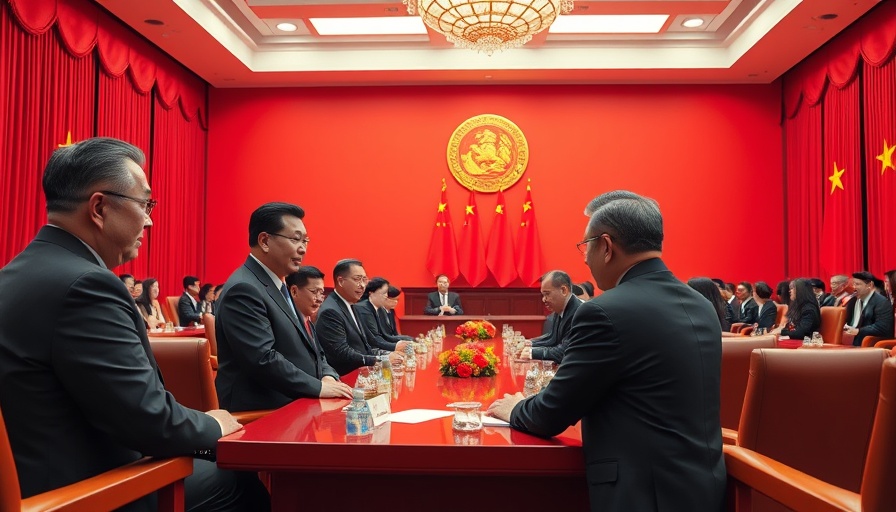
China's Diplomatic Efforts Amid Global Pressure
In a decisive move, Xi Jinping has ramped up diplomatic outreach in an attempt to build a coalition against the Trump administration's tariffs. His strategy involves engaging with various countries to foster a united front that counters what China sees as unilateral aggression from the U.S. During state visits to Vietnam and Malaysia, Xi was met with displays of support, emphasizing the importance of a cooperative regional framework.
The Stakes: China's Place in Global Trade
The stakes are extraordinarily high for China. The nation, once hailed as the world’s manufacturing hub, now faces increasing pressure as the U.S. seeks to implement debilitating tariffs on its exports. Xi’s administration understands that the stability of China’s economy hinges on its ability to maintain open markets for its goods, which have suffered under the weight of American tariffs. Diplomatic meetings with EU officials and countries in Asia underscore a strategic pivot towards ensuring economic allies.
The Role of Trade Tariffs in Global Relations
Trade tariffs have become a central theme in global economic relations. As China continues to impose its own tariffs on U.S. goods, the ripple effects are felt across the globe. Countries such as Vietnam and Malaysia are key players in this scenario. By aligning with China, these nations could safeguard their trade interests while pushing back against U.S. economic policies—policies that many perceive as bullying tactics intended to isolate China economically.
Contrasting Perspectives on China’s Strategy
While some countries express wariness about China’s overtures, fearing potential repercussions from the U.S., others see an opportunity for collaboration. Nations in the Asia-Pacific region are balancing their economic dependencies on the U.S. with the prospects that come from engaging with China. This balancing act reveals a complex interplay of global power dynamics, where each nation weighs the benefits and risks of forming alliances.
China's Initiative: Building a Diverse Coalition
China's outreach not only seeks to prevent diplomatic isolation but also aims to present a narrative of resilience amid adversity. Xi's administration is exploring bilateral and multilateral agreements that could strengthen economic ties without relying solely on U.S. markets. The emphasis on collaboration with countries across Europe and Asia is intended to bolster China's waning influence without igniting further trade tensions.
Implications for Future Global Trade Dynamics
The current trade tensions are far from a mere back-and-forth saga. They represent a fundamental shift in how countries engage in international trade. With Xi’s positioning, the question arises: what will be the future of global trade? Continued pressure on both fronts—China and the U.S.—will likely lead to a reconfiguration of longstanding trade partnerships. Nations may increasingly find new alliances as they navigate the evolving economic landscape.
The Human Element: Impact on Consumers and Markets
As these diplomatic strategies unfold, the impact on everyday consumers cannot be ignored. Tariffs often lead to increased prices for goods, affecting individuals globally. For instance, American consumers may face higher prices on Chinese imports as a direct result of these trade policies, while Chinese exporters may struggle to find new markets amidst growing geopolitical tensions. The interdependence of the global market means that actions by governments tend to trickle down directly to consumers, affecting everything from food prices to electronics.
Conclusion: The Road Ahead for China and Global Trade
The future of international relations hinges on the outcomes of these diplomatic initiatives. As China continues its efforts to unite countries against what it views as unjust tariffs, the potential for new partnerships and conflicts rises. Observers will need to stay informed about these developments as they unfold, considering the stake every nation holds in the global economy.
 Add Row
Add Row  Add
Add 




 Add Row
Add Row  Add
Add 

Write A Comment